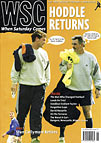 David Rocastle died of cancer on March 30, aged 33. Sean Hanson looks back on the life and career, both all too brief, of the Arsenal and Engalnd star
David Rocastle died of cancer on March 30, aged 33. Sean Hanson looks back on the life and career, both all too brief, of the Arsenal and Engalnd star
It was on the fields of Beckenham Place Park in south-east London, playing schools and park football, that the young David Rocastle began to shine, and anyone watching knew he was going to be something special. A few years later, he was signing schoolboy forms at Arsenal, a contemporary of Tony Adams, Martin Keown, Michael Thomas and Gus Caesar.
In a recent interview the sports minister Kate Hoey described how much it meant to Rocastle when he signed. He rushed home, excited because his mother, widowed when Rocky was only five, would finally have the prospect of an additional income to support the close, but not well-off, family.
I remember the early Rocastle very well. I had started watching from the North Bank in 1983, and had endured the drudgery of life under Terry Neill and Don Howe. Many of the team had seen better days, and the black players, such as Chris Whyte and Paul Davis, would occasionally bear the brunt of the crowd’s anger after another pedestrian performance. I remember one game in particular when a couple of old gits wheedled and whined beside me about how the Arsenal was just not the same now, and it was obvious that we were crap if we had to rely on picking “darkies”.
That was soon to change when a crop of talented young black lads from south London and surrounds arrived on the scene via the youth squad. Rocastle made his debut in a 0-0 draw against Newcastle on September 28, 1985. Michael Thomas soon followed, then Kevin Campbell, and, alongside Davis, they silenced the critics with a style and spirit that shamed the older players.
Here was a group of young athletes who were skilful, intelligent, played with humour and had bucketfuls of spirit. Proud and fiercely loyal, they were part of a revolution that changed the way black players were perceived by the crowd, one that fully matured when Ian Wright was raised to hero status at Highbury. They were no longer merely tolerated, at best, but became the very heart of the team.
Rocky will be long remembered for his part in the semi-finals and final of the League Cup in 1987. These were the games that spawned the song and Arsenal fanzine, One-Nil Down, Two-One Up. In two games against Tottenham and the final against Liverpool, Arsenal came from behind to win and Rocastle was the star of all three games, scoring an injury-time winner in the semi-final replay at White Hart Lane.
Two years later, he was at the scene of what Nick Hornby describes as “the greatest moment ever”, in the team that grabbed the league title for the first time in 18 years with the last kick of the game at Anfield. There is a famous picture of Rocastle holding the trophy with the goalscorer, Michael Thomas, and you can tell that his heart was nearly fit to burst.
He won the league title again with Arsenal in 1990-91 and the following year scored a goal at Old Trafford that endeared him to many Arsenal fans for life, a long-range looping effort that hit the bar and bounced into the net off Peter Schmeichel’s back. But it was at this time that Rocky’s career started to decline. A knee injury kept him out of Bobby Robson’s World Cup squad, though he had played in five of the six qualifiers. Further injuries started to rob him of his pace.
Rocastle was left out of George Graham’s side more and more and in July 1992 moved to Leeds for £2 million. He endeared himself to the Leeds fans with glimpses of his skill, but more injuries and another “functional” manager, Howard Wilkinson, did for him and he moved on again.
Rocastle’s swift decline thereafter, in which he drifted from Leeds to Man City to Chelsea, Hull, Norwich and Malaysia, was frequently coloured by rumours among supporters. Some said there had to be an unspoken reason why his star fell so quickly. Rocky was not always an angel. He was one of the players who came in for most criticism from Arsenal after the 21-player brawl with Man Utd that resulted in record fines and point deductions for both teams in October 1990.
But whatever the truth of the rumours, and I have yet to hear a credible source for them, there can be no question that the injuries he sustained were the real reason why he was unable to last at the top levels of the game. Having spoken to friends of Rocky’s, young and old, the only thing they will say about him is that he was nice, a gentleman, courteous, fun, loyal and a good father and husband. And, of course, a great footballer who was at the heart of the most momentous events in Arsenal’s recent history. That’s how we’ll be remembering him.
From WSC 171 May 2001. What was happening this month